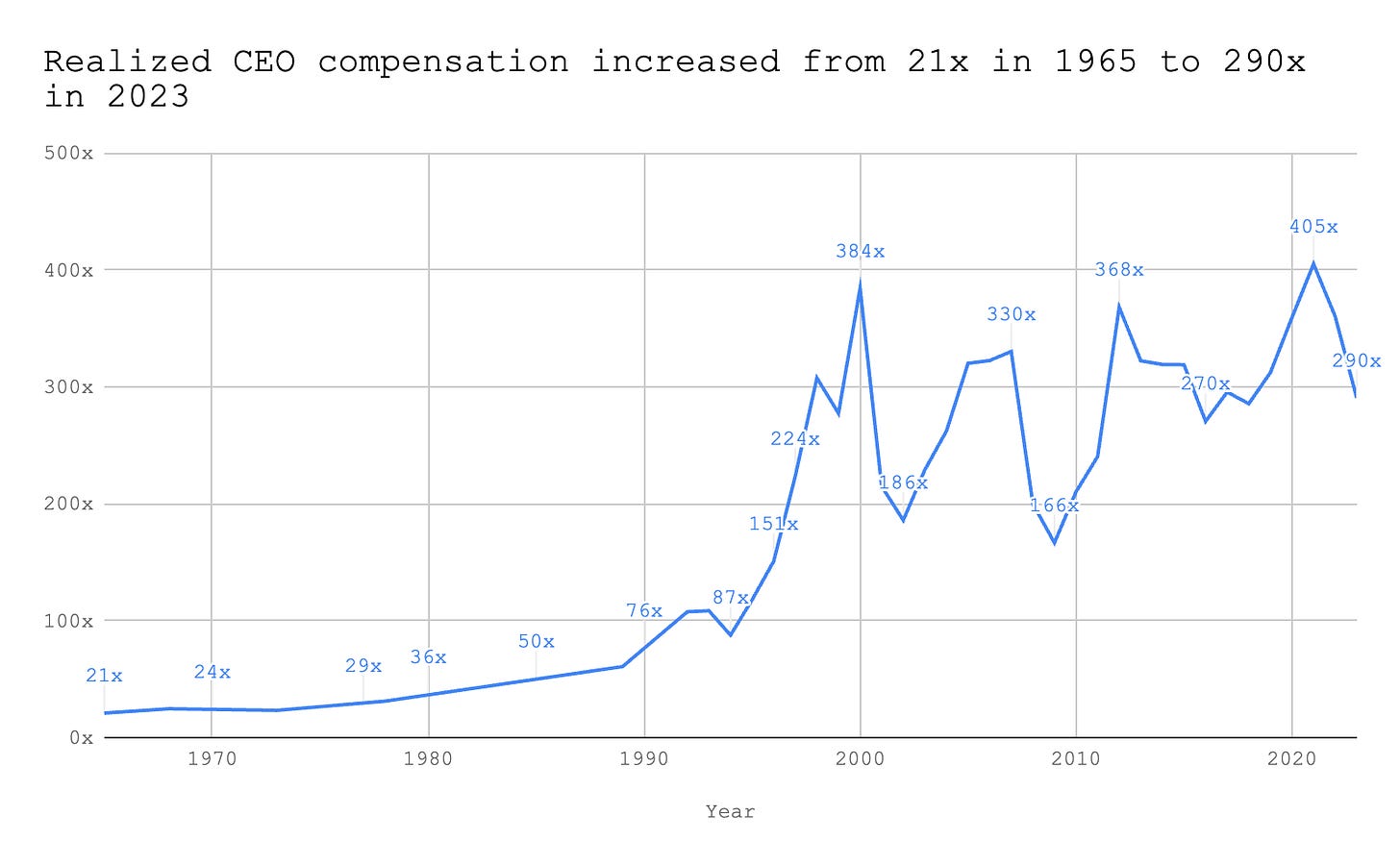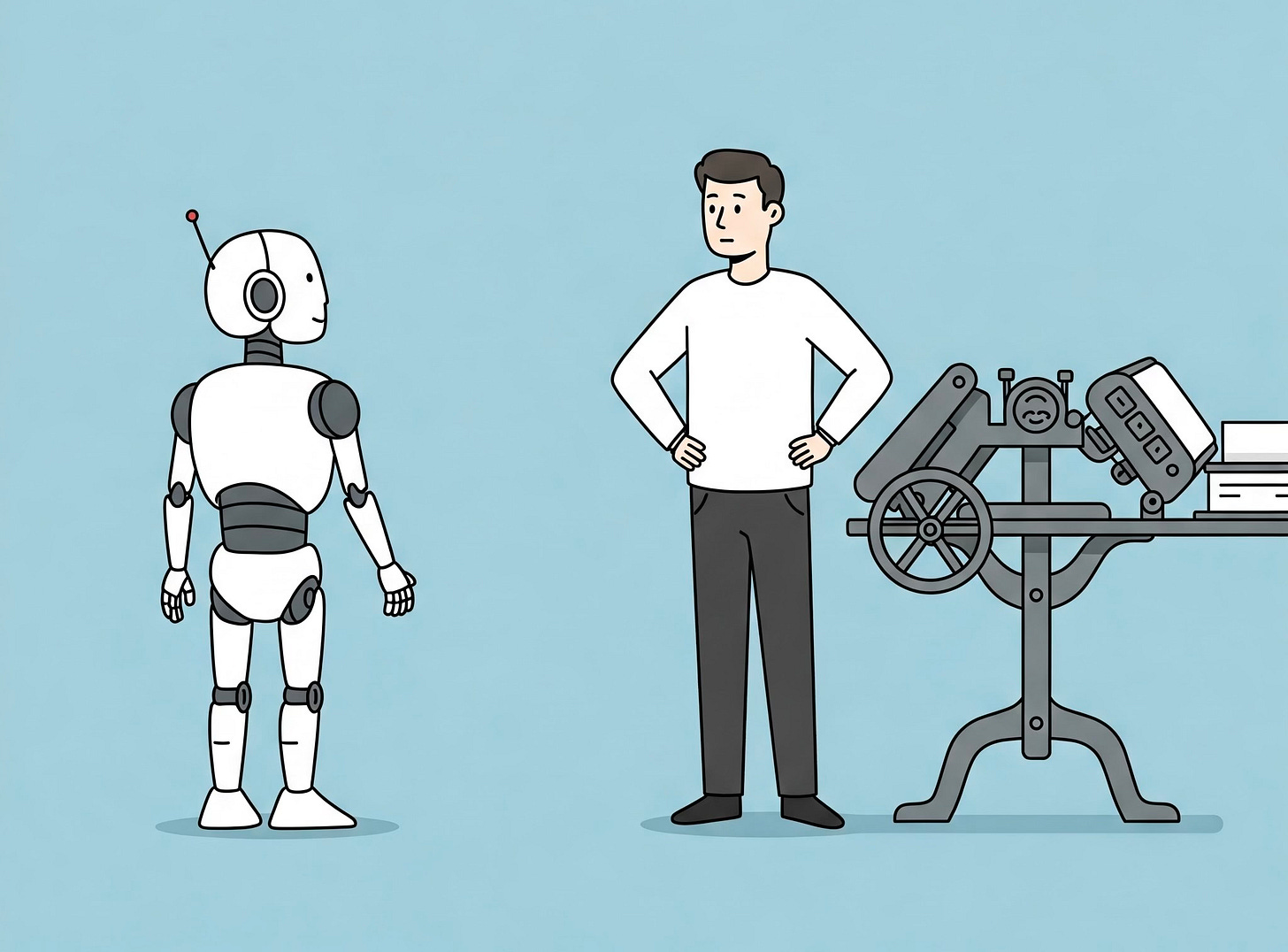How AI Is Creating New Avenues to Demonstrate Intelligence
From classrooms to boardrooms, AI is reshaping how talent is measured and rewarded
Generative AI has helped me interpret blood test results. I have friends who have used generative AI to help them write their wedding vows. Google’s CEO compared it to the discovery of fire; others have compared it to the invention of the printing press (a view I share). The printing press made knowledge more accessible, and now AI is driving that cost down even further. This transformation, despite a mix of legitimate and illegitimate resistance, should enable new applications and business models.
Automation and Growth
AI already outperforms humans in many domain-specific knowledge areas. However, there is an argument that “AI + humans” is superior to AI alone.
A recent article in JAMA, “An AI Chatbot Outperformed Physicians and Physicians Plus AI in a Trial—What Does That Mean?”, calls that argument into question. AI alone may soon surpass “AI + humans” in certain contexts. What might that mean for workers if AI continues to outperform in more contexts?
These are stirring thoughts. I don’t pretend to have the answers, but I believe society should not blindly fear AI. It has the potential to cure disease and eliminate monotonous work. AI could boost GDP to double-digit growth, as suggested by Microsoft CEO Satya Nadella. Expanding the economic "pie" offers more stability and prosperity than competing for a fixed one.
While I am rooting for growth that lifts us all up, a large automation transition will be lumpy and disruptive. Nonetheless, automation has always created new jobs that replace old jobs. If that pattern doesn’t hold this time, I expect democracies will vote in generous solutions for permanently displaced workers (or incumbent politicians will risk being voted out).
The question entrepreneurs and executives are likely asking themselves at this point: How does the “cost of human errors” compare to the “cost of AI errors”? Those asking such a question are probably looking at the U.S. market given the simple equation:
High cost for human intelligence in the U.S. (-) low cost of AI intelligence (=) target for automation
Of course, it’s not that simple though. Gatekeepers such as regulators and unions may stand in the way, sometimes with legitimate concerns and sometimes out of self-interest.
Gatekeepers and the Printing Press
While the printing press fueled the Scientific Revolution, the Protestant Reformation, and the democratization of knowledge by making information widely accessible, it also enabled propaganda, disinformation, and even fueled witch hunts by amplifying mass hysteria.
Safety is a real concern per AI 2027. Safety concerns aside, resistance is still inevitable. Universities, elite institutions, and licensing bodies all have a vested interest in maintaining their role as gatekeepers of expertise. AI threatens that status quo. The printing press broke the Catholic Church’s monopoly on knowledge and power; AI could challenge today's elite structures.
Meritocracy Mechanics and Human Intelligence
The attempt to measure intelligence has long been a function of standardized testing where young people’s futures are largely decided by how they answer questions in grammar, math, and reading comprehension. These tests have served as the gates to prestigious institutions, creating a pipeline—elite college to elite career—that has dominated social order since the 1950s. Generative AI threatens to disrupt this system by providing tools that allow anyone to "catch up" in these narrowly defined domains. Suddenly, skills that elites leveraged to justify their position are now accessible to the masses. This shift could dismantle the exclusive 'track' that has upheld elite hierarchies for decades and redefine the current purported meritocratic system.
David Brooks, in his December 2024 article "How the Ivy League Broke America," critiques this meritocratic system for fostering arrogance among elites who believe their higher status is entirely self-earned. His most notable paragraph:
Would we necessarily say that government, civic life, the media, or high finance work better now than in the mid-20th century? We can scorn the smug WASP blue bloods from Groton and Choate—and certainly their era’s retrograde views of race and gender—but their leadership helped produce the Progressive movement, the New Deal, victory in World War II, the Marshall Plan, NATO, and the postwar Pax Americana. After the meritocrats took over in the 1960s, we got quagmires in Vietnam and Afghanistan, needless carnage in Iraq, the 2008 financial crisis, the toxic rise of social media, and our current age of political dysfunction.
Our current “meritocratic” system is broken, or at least deeply flawed, from both an inputs perspective—standardized tests—and an outputs perspective—from Afghanistan to the CEO-worker pay gap.

Thomas Wolf, co-founder of Hugging Face, a leading AI tools site, doesn’t claim to have meritocracy figured out though he does appear to have a view on the definition of intelligence in his blog:
The main mistake people usually make is thinking Newton or Einstein were just scaled-up good students, that a genius comes to life when you linearly extrapolate a top-10% student.
This perspective misses the most crucial aspect of science: the skill to ask the right questions and to challenge even what one has learned.
It is clear that as generative AI levels the playing field, alternative markers of intelligence will become more valued. With math and language skills somewhat commoditized, the job market will increasingly demand people exhibiting curiosity, agility, teamwork, passion, and agency. In turn, universities feeding these employers will have to, if possible, find ways to reliably and ethically measure these forms of intelligence should they want to maintain their meritocratic claims.
Even if I am wrong and the standardized tests of today retain their importance, everyone will now have access to virtually free, world-class AI tutoring. A tutor can make a big difference—mine helped me bring my ACT English score up from a 24/36 to a 32/36 in a matter of weeks back in high school.
Maybe AI has arrived in time to burst the higher-education bubble and broaden narrow meritocratic hierarchies.
And so in closing, maybe we’ll get growth—plus a society with fewer gates and more opportunity.
Disclosure: This article is for informational purposes only and should not be considered financial or investment advice.
Thanks for reading—this article is the first in a series covering the top half of the AI stack. The second, “Pinballs & Pathways: Overlooked AI Logistics Networks”, can be found here. The third and final, “The Coming Disruption by AI Native Companies”, can be found here.


